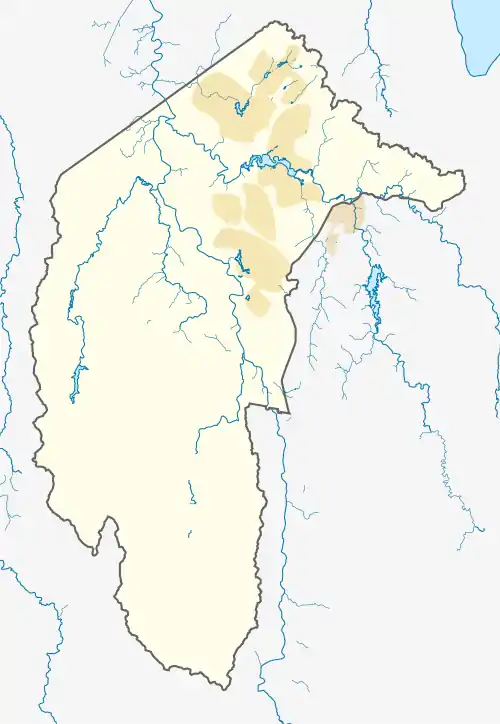| Latham Canberra, Australian Capital Territory | |||||||||||||||
|---|---|---|---|---|---|---|---|---|---|---|---|---|---|---|---|
 Latham | |||||||||||||||
| Coordinates | 35°13′02″S 149°01′53″E / 35.21722°S 149.03139°E | ||||||||||||||
| Population | 3,767 (SAL 2021)[1] | ||||||||||||||
| Established | 1971 | ||||||||||||||
| Postcode(s) | 2615 | ||||||||||||||
| Elevation | 575 m (1,886 ft) | ||||||||||||||
| Area | 2.7 km2 (1.0 sq mi) | ||||||||||||||
| Location |
| ||||||||||||||
| District | Belconnen | ||||||||||||||
| Territory electorate(s) | Ginninderra | ||||||||||||||
| Federal division(s) | Fenner | ||||||||||||||
| |||||||||||||||
Latham (/ˈleɪθəm/) is a residential suburb in the Belconnen district of Canberra, located within the Australian Capital Territory, Australia. The suburb is named for John Latham, Chief Justice of the High Court of Australia from 1935 to 1952. Streets in Latham have the names of Australian judges.[2]
Location and features
It is bounded by the suburbs of Charnwood, Flynn, Florey, Higgins, Holt and Macgregor. It is surrounded by Ginninderra Drive on the north, Florey Drive on the west, Southern Cross Drive on the south, and Kingsford Smith Drive on the east.
Latham has a primary school, a neighbourhood oval and a number of children's playgrounds. Ginninderra Creek runs through Latham, and there are open areas of grassland adjacent, such as the Umbagong district park. Traces of Aboriginal culture remain along the Creek with a marked site of axe-grinding grooves.[3][4] Latham also has an ACTEWAGL/Evoenergy substation.
From the mid-1970s Latham had a local shopping centre (supermarket, butcher, Chinese restaurant, chemist (later a school uniform/limited sportswear store), hair dresser, bakery, newsagent, doctor's surgery (later physiotherapist) and post office), and a petrol/service station (closed in early 1993).
The shopping centre wound down between 1996 and 1998 after a fire that destroyed the supermarket and caused roof damage to the rest of the centre. The schoolwear shop, which had occupied the old chemist shop, also took in the local post office function. After the fire, the owners moved the schoolwear and post office business to the vacant petrol station site. The post office shop was authorised to limited "corner store" duties from early 1998. The butcher, restaurant and physiotherapist left 12–18 months after the fire, with the restaurant the last to leave and the complex finally fenced off in May 1998. The complex no longer exists: a townhouse development now occupies the site. Planning was eventually approved after the developer responded to local pressure to include a small corner store at the edge of the complex, on the corner of Onslow Street and Dalley Crescent. The former petrol station site was later cleared and replaced by another townhouse development.
Political representation
For the purposes of Australian federal elections for the House of Representatives, Latham is in the Fenner electorate.[5]
For the purposes of Australian Capital Territory elections for the ACT Legislative Assembly, Latham is in the Ginninderra electorate.[6]
Geology
Most of Latham is covered by the upper Silurian Deakin Volcanics. From the north east of Latham to the south west, the following stratigraphic layers of volcanics are passed:
- green grey and purple rhyodacite.
- grey rhyodacitic tuff
- purple rhyodacite
- purple and green tuff
- pink rhyolite
- purple-pink rhyolite
Upper Silurian Laidlaw Volcanics grey tuff form a wedge over the top of the Deakin Volcanics.<ref>Henderson G A M and Matveev G, Geology of Canberra, Queanbeyan and Environs 1:50000 1980.</ref
References
- ↑ Australian Bureau of Statistics (28 June 2022). "Latham (ACT) (suburb and locality)". Australian Census 2021 QuickStats. Retrieved 28 June 2022.
- ↑ "Suburb Name search results". ACT Environment and Sustainable Development. Retrieved 11 February 2014.
- ↑ Flood J (1983) Report on Axe-grinding grooves, Latham (Canberra Archeological Soc)
- ↑ ACT Heritage Council (2017) Background Information Umbagong District Park Grinding Grooves
- ↑ "Profile of the electoral division of Fenner (ACT)". Current federal electoral divisions. Australian Electoral Commission. 8 February 2016. Retrieved 29 May 2016.
- ↑ "Electorates 2012 election". Electorates. ACT Electoral Commission. 5 July 2012. Retrieved 17 December 2013.